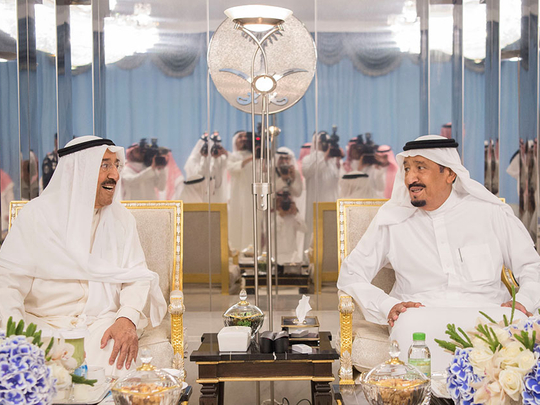
Abu Dhabi/Dubai: The GCC Summit will convene in Kuwait on Wednesday, despite an ongoing Qatar crisis, analysts have said.
“The GCC Summit will convene in Kuwait, because all member countries are determined to maintain this significant Gulf institution, although it falls short of expectations, and out of respect to the host country and its Emir, Shaikh Sabah Ahmad Al Jaber Al Sabah,” said Mohammad Al Hammadi, Editor-in-Chief of the Arabic daily Al Etihad.
Al Hammadi, however, noted that the level of representation was not clear yet. “The meeting is important, but the level of representation of GCC members was not clear, yet.”
Noting that the summit was not going to bring about a solution to the Gulf crisis, Al Hammadi told Gulf News the summit would, rather, be the beginning of the end of the rift with Qatar.
A rift between the Gulf Cooperation Council (GCC) members Saudi Arabia, UAE and Bahrain, on one side, and Qatar on the other has put this year’s annual meeting in doubt.
Bahrain said in October it will not attend the summit if Qatar does not change its policies, adding that Qatar should have its membership in the six-nation group suspended.
Dr Fayez Al Nashwan, professor of international relations at Kuwait University, told Gulf News Kuwait is resolute to convene the summit on time and with all GCC members attending.
“I believe the GCC Summit in Kuwait will bring about a solution to the Qatar rift. Kuwait, which had led mediation efforts between the two sides, would try again to use the meeting to resolve the rift,” Dr Al Nashwan added.
Dr Al Nashwan said Shaikh Sabah’s recent visit to Saudi Arabia was an effort to persuade King Salman Bin Abdul Aziz to attend meetings in Kuwait to save the GCC from collapsing because of the crisis with Qatar.
He said the Saudi position was that a summit couldn’t be convened given the current situation.
The Kingdom, along with the UAE, Bahrain and Egypt, severed ties with Qatar on June 5 over what they described as Doha’s interference in their countries’ internal affairs and its support for radical groups, such as the Muslim Brotherhood, designated a terrorist organisation in all four countries.
Importance of unity
Dr Al Nashwan said Shaikh Sabah tried to persuade GCC members that the unity of the body was more important than differences that can be overcome with time.
He confirmed there had already been a solution to the crisis, but the problem lies in guarantees that Qatar commits itself to the quartet’s demands, once an agreement signed.
- Hamad Al Amer, a GCC political analyst
Hamad Al Amer, a GCC political analyst, said the summit should proceed as scheduled even if Qatar does not attend, warning that Iran was benefitting from the current situation.
“The GCC summit must be held on time even without Qatar because it will be a highly significant historic event that must not be impacted by the Qatar crisis,” Al Amer, Bahrain’s former undersecretary for the GCC, said.
“Holding the summit is a strong indication of cooperation among Gulf people. Even if the summit cannot be held in Kuwait, it should be shifted to the GCC headquarters as stipulated by the statute.
"The great importance of the GCC and its role in protecting the security and sovereignty of the region in light of the dangers facing it from all sides requires the preservation of this great edifice from collapsing by holding its next summit.”
Al Amer said that the “worrying” situation in the GCC must end immediately.
“The dissolution and collapse of the alliance are directly in the interest of Iran, which has for centuries sought to extend its control over the region by using all means, in cooperation and coordination with all the forces that share its objectives and interests.
A GCC summit this week will send a strong message to Iran that the Gulf relations have mechanisms and foundations that reflect the sovereignty of the GCC countries and their unified stance towards the Iranian-led threats.
“The message will be clear that no relations can be established with Iran if it does not stop its interference in the internal affairs of the Gulf countries and the use of its arms in Iraq, Lebanon and Yemen to threaten the security of the Gulf and the region,” he said.
The second message that the summit will sent will be for Qatar, he added.
Intra-GCC relations
“The intra-GCC relations are now governed by new binding rules and conditions. Accordingly, Qatar must demonstrate its commitment to these principles by immediately and earnestly announcing its implementation of all the provisions of the Riyadh Agreement and the Supplementary Agreement signed in 2014. Both include many of the demands issued at the start of the crisis. A strict timetable for their implementation should also be issued.”
Al Amer added that the non-attendance of a member country of the alliance could not hinder holding the summit.
The GCC has been holding an annual summit, usually in December, in one of its member countries based on a rotating basis.
“The GCC held a summit in 1996 in Doha without Bahrain which refrained from attending over the Huwar islands and a dispute that arose with Qatar in 1990 also in Doha. In 1995, Qatar pulled out of the GCC summit after it chose Saudi Arabia’s candidate Jameel Al Hujailan as Secretary General over Qatar’s choice Abdul Rahman Al Attiyah,” he said.
Al Amer said that it was equally important for the summit to adopt critical executive decisions that would pave the way for greater Gulf integration and union and set a robust foundation to deal with crisis.
He suggested the summit establish executive mechanisms to activate the dispute settlement commission which has been inoperative since the launch of the council and stipulated in Article 10 of its statute.
“It will look into controversial cases, find feasible solutions and determine penalties ranging from paying financial compensation to cancelling membership in case of non-compliance with the resolutions of the commission,” he said.
“The summit should also achieve the full Gulf citizenship through the GCC common market, the monetary union, the unified GCC passport, water network project and other development projects, all of which are aimed at consolidating steps among the GCC countries to reach the economic union and enhance the status of the GCC as a global financial, investment and economic centre.”
Al Amer said the summit should also work on immediate solutions to border disputes, explaining that they are a “covert source of mistrust” among the GCC states, affect bilateral and collective relations, and overshadow all sensitive issues at all levels.
“The GCC countries should consolidate their foreign policy on regional and international issues to ensure the protection of the security and interests of the region. This will help secure an agreement on the council’s policy as a regional organisation towards Iran,” Al Amer said.













